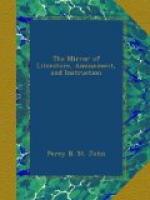Sea Air.
The atmosphere, in the vicinity of the sea, usually contains a portion of the muriates over which it has been wafted. It is a curious fact, but well ascertained, that the air best adapted to vegetables is pernicious to animal life, and vice versa. Now, upon the sea-coast, accordingly, animals thrive, and vegetables decline.—Hurwood’s Southern Coast.
* * * * *
Chingford Church.
[Illustration: Chingford Church]
The roof with moss is green, and twines
Dark ivy round the sculptur’d lines.
DELTA.
The pleasant village of CHINGFORD, in Essex, may be called a vignette of the topographer’s “rus in urbe,” it being only nine miles distant from the heart of London, and consequently almost within its vortex. It stands on the banks of the river Lea, and derives its name from the Saxon word Cing and ford, (signifying the king’s ford,) there having formerly been a ford here; the adjoining meadows being designated the king’s meads, and the Lea, the king’s stream. There appears to have been two manors in this parish, one of which was granted by Edward the Confessor to the cathedral of St. Paul’s, but surrendered at the reformation to Henry VIII.; the other, according to Domesday Book, was held by Orgar, the Thane; and from the latter another manor has since been taken.
The “ivy-mantled” church, represented in the above vignette, is dedicated to St. Peter and St. Paul, and consists of a chancel, nave, and south aisle, with a low square tower at the west end, containing three bells. Within the church are a few interesting monuments, among which is one to the memory of Robert Rampton, who died in 1585 and was yeoman of the chamber to Edward VI., and the Queens Mary and Elizabeth. It stands in the south aisle, with an inscription on a brass plate against the wall, underneath which is an altar tomb covered with a slab of black marble, on which are the effigies, in brass, of Robert Rampton, and his wife Margaret, who died in 1590.
Altogether, Chingford is one of the prettiest villages near London, and its church is a picturesque attraction for pedestrian tourists, and such as love to steal away from the maelstroom of an overgrown metropolis, to glide into scenes of “calm contemplation and poetic ease;” although much of the journey lies through avenues of bricks and mortar, and trim roads that swarm with busy toil.
In the parish of Chingford is an estate called Scots Mayhew, or Brindwoods, which is held of the rector by the following singular tenure:—“Upon every alienation, the owner of the estate, with his wife, and a man and maid servant, (each upon a horse) come to the parsonage, where the owner does his homage, and pays his relief in manner following:—He blows three blasts with his horn, carries a hawk on his fist, and his servant has a greyhound in a slip—both for the use of the rector that day. He receives a chicken for his hawk, a peck of oats for his horse, and a loaf of bread for his greyhound. They all dine, after which the master blows three blasts on his horn, and they all depart."[5]




